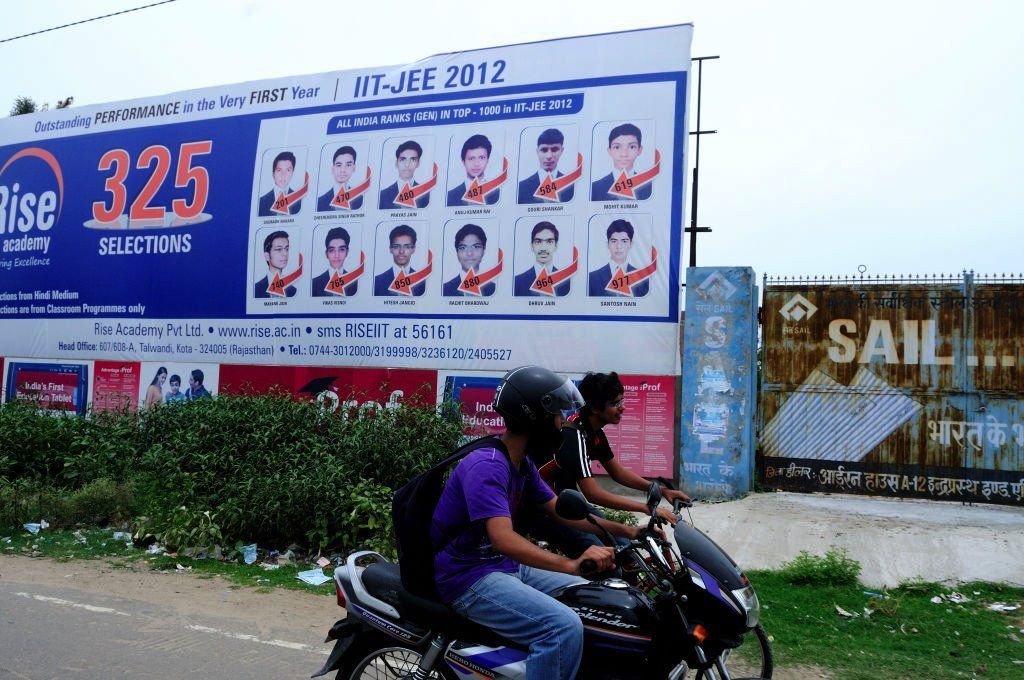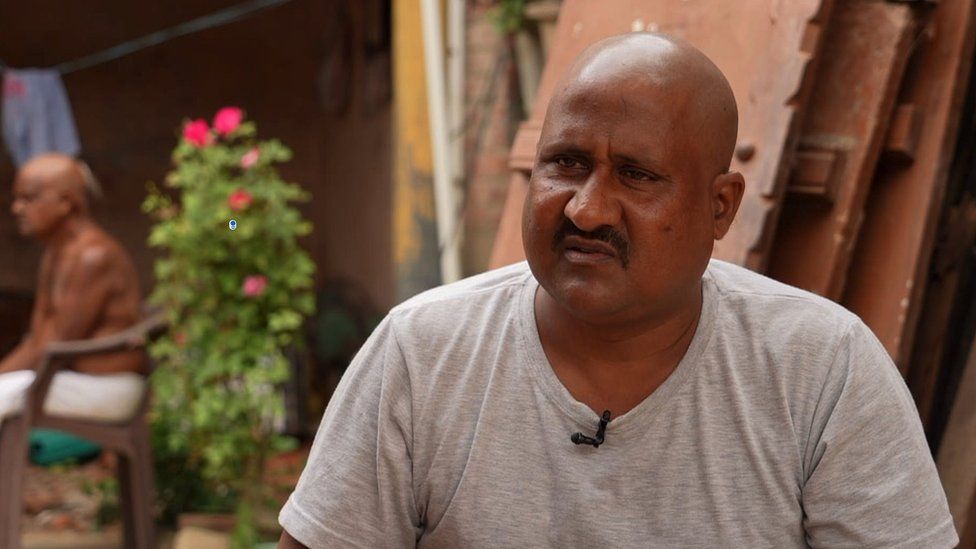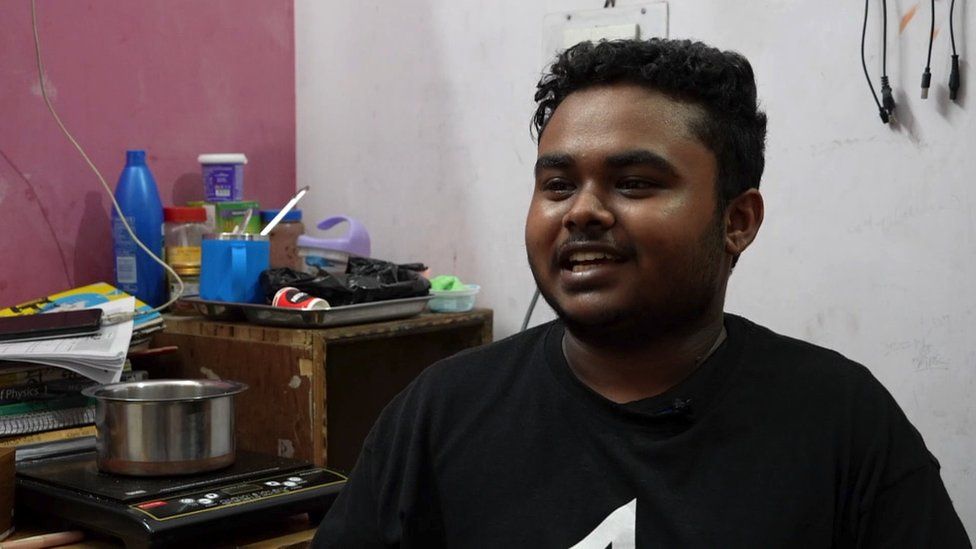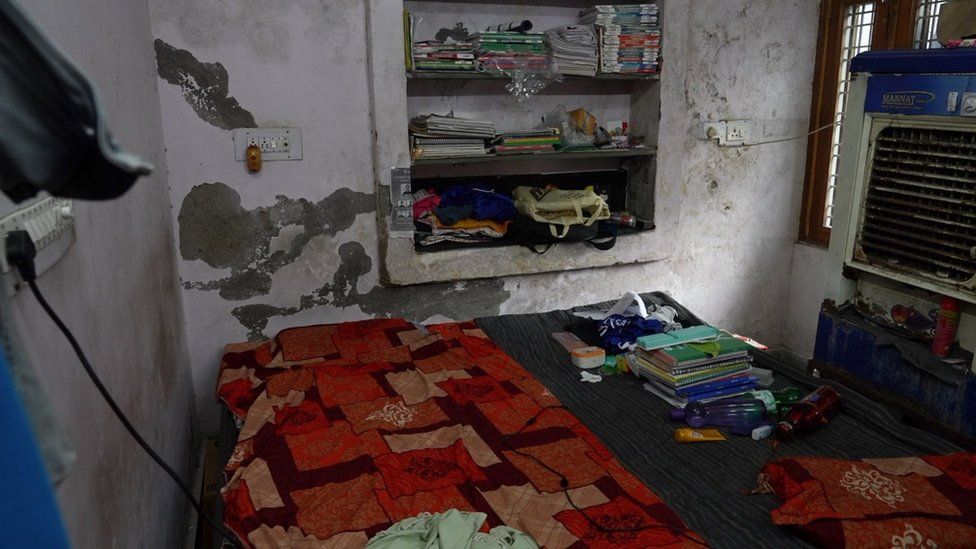Coaching centres in the northern Indian city of Kota are facing tighter regulations after a rise in the number of student suicides. BBC Hindi’s Vineet Khare has been talking to pupils who have travelled to Kota to receive tuition to help them pass entrance exams for elite colleges and found many feel intense pressure to succeed.
Twenty-one-year-old Vijay (not his real name) has failed the entrance exam for medical college three times. He had hoped that studying at an expensive coaching centre in Kota in the north Indian state of Rajasthan would get him through the test.
Like many other students, Vijay had seen Kota as the land of dreams.
The city is dotted with large billboards bearing the names, pictures and rankings of successful pupils. More than 200,000 students, some as young as 13, come here to study and are living in hostels or privately rented accommodation.
It is well known for its educational centres, designed to prepare young people for India’s highly competitive entrance exams to the best medical and engineering colleges. There are 12 large coaching centres and at least 50 smaller ones.
Pride, pressure, and anxiety
Winning a place to these elite colleges is a source of pride for Indian parents and failure is frowned upon. Institutes charge more than 100,000 Indian rupees ($1,200, £1,000) per year, a high sum for many families. But entry into a top engineering or medical college is a ticket to a high-paying job.
Vijay’s family lives in the countryside and is not well off. His father is a farmer and the fear of disappointing his parents weighed heavily on his mind.
“I used to lie to my parents about my bad test results,” he admits.

He tells me at one point his growing anxiety was giving him headaches and chest pain and it was after failing his second exam that he came close to killing himself.
“I felt I had no option left,” he says.
“I had wasted my parents’ money and damaged their reputation.
“The pressure of the situation triggered my suicidal thoughts, but I just kept them to myself,” he explains.
Vijay says he changed his mind after he saw a Bollywood star, Deepika Padukone, talking about her depression. The actress spoke publicly about how overworking is often glorified and the negative impact it can have on mental health. Her openness inspired him to seek help. Vijay is now getting psychiatric treatment and says he is trying to take each day as it comes.
Other students also tell me about the hardship of living alone, high parental expectations, peer pressure, cut-throat competition and 14-hour-days. More than 100 students in Kota have taken their lives in the past 10 years, including at least 25 this year – the highest ever in a single year, according to police data.
One of those suicides – a 15-year-old girl – happened during my visit to the city.
It’s not clear why she took her own life. “She never mentioned any study-related distress to us,” her father told me over the phone while on his way to Kota after receiving the news about her death. “But she did talk about student suicides in Kota… I told her to focus on her studies instead,” he added.

Analysis of government figures by a local newspaper, the Hindustan Times, concluded that most of the student suicides in Kota in 2023 involved boys under the age of 18 preparing for medical tests, who mostly came from low-income families living in remote areas of north India.
Adarsh Raj, who was also from a farming family and studying in Kota, wanted to be a doctor but took his own life in August, at the age of 18. His family is devastated. “We did not put pressure on him. We feel that low marks in his tests led to his depression, which made him take this extreme step,” his uncle Harishankar tells me. “But suicide is not the solution.”
Regulation, helplines and mental health workshops
As a result of the recent rise in suicides among students in Kota, the Rajasthan state government has announced stricter rules for these coaching institutes.
On 29 September it issued guidelines which include not encouraging student admissions below class nine (pupils aged 14) and not making test results public.
More prominence will also be given to mental health workshops and programmes for students. An initiative to ensure more posters are put up to advertise a student support helpline is underway as well.

A team of 11 people tasked with identifying students showing signs of depression was set up in June, led by senior police officer, Chandrasheel.
“We go to hostels and talk to people to find out which students are showing signs of behavioural changes,” he explains. “If there are warning signs, we monitor the student, interact, talk to the hostel warden and speak to the parents.”
Covid pandemic and isolation
The World Health Organization cites suicide as the fourth leading cause of deaths among 15 to 29-year-olds globally.
In India more than 13,000 students killed themselves in 2021, an increase of 4.5% compared to 2020, according to government figures.
One teacher tells me the number of children in a class in a coaching centre can be very high – up to 300 – and sometimes teachers don’t know the individual names of their pupils, which can leave children feeling isolated.
The Covid pandemic and multiple lockdowns have also had a major impact.
“The capacity of post-Covid students to withstand stress is less than before,” Nitin Vijay, the managing director of one of India’s leading coaching centres Motion Education tells me. “But this will improve with time,” he insists.

Urmil Bakshi, who has worked in the field of education for decades, agrees that the pandemic has impacted the ability of students to interact with their peers and teachers. But she also blames the commercialisation of coaching in Kota for the current situation.
“Classes comprise hundreds of students. Teachers don’t know their names. A child is unable to make friends, for fear that another student may move ahead by finding out more about how they are studying. The child is left alone,” she says.
There are more than 3,500 hostels and thousands of private rented places where students can live in Kota, which contribute a huge amount of money towards the city’s economy.
I decide to take a look at the type of accommodation on offer in the Vigyan Nagar area of Kota. An unlit passageway leads to stairs that take me up to a student’s second-floor flat. I make my way inside the dilapidated, cramped room which has a toilet next door. Living here is 18-year-old Arnav Anurag, who moved to Kota to become a doctor – his passion since childhood.
Some books are stacked on a shelf and more are scattered on the bed. There’s a laptop to one side and an air cooler on the other. Clothes hang on the back of the door and a poster of the periodic table has been hung on the wall.
“It’s suffocating here,” admits Arnav. “But once I clear the examination, I can leave and declare this was where I once studied,” he says confidently.
The new guidelines include mandatory training for wardens of hostels and other staff at student accommodation, as well as teachers and institute managers.
They also include a provision for an “easy exit and refund policy” for students who are struggling.
But in Vijay’s opinion, a complete culture change is needed. “Let children follow their passion,” he says.
“Parents should tell their children that there is a world beyond engineering and medicine. A child’s life is more important than anything else.”
Source : BBC









